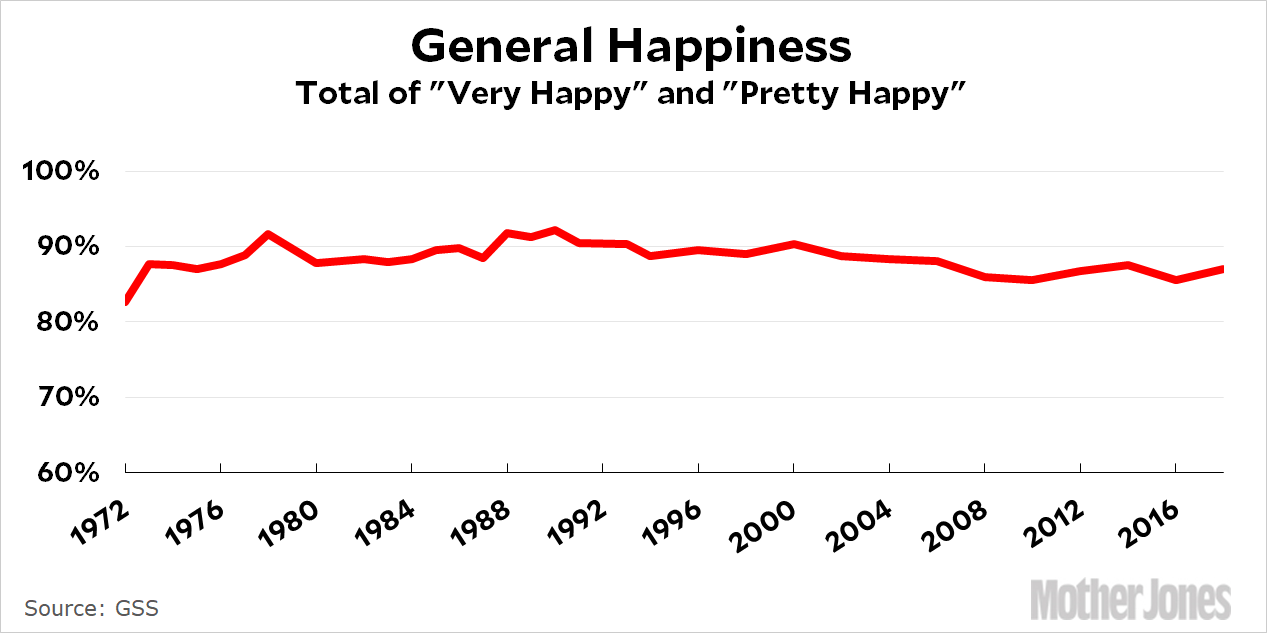It is rare for me to disagree with Ezra Klein quite so vigorously, but this is just wrong, wrong, wrong:
Democrats mocked [Donald Trump’s] “I alone can fix it” message for its braggadocio and feared its authoritarianism, but they did not take seriously the deep soil in which it was rooted: The American system of governance is leaving too many Americans to despair and misery, too many problems unsolved, too many people disillusioned. It is captured by corporations and paralyzed by archaic rules. It is failing, and too many Democrats treat its failures as regrettable inevitabilities rather than a true crisis.
Political parties that are out of power normally have a keen interest in making things sound terrible. After all, they have to promise to fix things in order to get the votes to get back in power, but nobody is interested in fixing things unless they’re convinced they need fixing. So Republicans shout about the deficit and moral decay because those are well-known ways of scaring people into voting against Democrats. Democrats insist that the middle class is dying and Medicare is under assault, because those are well-known ways of scaring people into voting against Republicans.
This is all normal—but it can become abnormal if both parties, along with pretty much every pundit, is insisting that the country is going to hell. To the average voter, it seems right now as if the deficit is skyrocketing, moral decay is rampant, the middle class is dying, and Medicare is under assault. And a hundred other things. Nothing is going well.
This is just flatly wrong. Obviously the COVID-19 pandemic has put everyone in a bad mood to begin with, but our national despair far predates that. So what’s going on?
I’m not going to bother putting up all the charts again, but the facts simply don’t bear out the doomsday thinking. Incomes are up. Crime is down. Kids are being educated. Racial resentment has been easing. Views on morality are about the same as always.¹ Health care costs are becoming more manageable. Interest payments on the national debt are low. The internet has provided everyone with huge new opportunities for entertainment and education and social togetherness. Electric cars are becoming more common and hands-free driving is no more than a few years away. And just last year, we created a vaccine for a brand new virus in less than a year. Less than a year!
Problems? Sure, of course. Climate change is the big one. Poverty is still with us, though it’s declined substantially over the past few decades. Racial justice still has a long way to go. Too many Americans continue to have no health coverage.
But are these problems worse than they were 30 years ago? Or 40? With the exception of climate change, no. They just aren’t. In practically every sense, the United States is better off today than it was in 1980. It’s also better off than just about any other country on earth. And we are not any less happy than we’ve ever been.

And yet nobody believes that we’re doing pretty well even though the evidence is all but irrefutable. Why? I believe the answer is not so much that we’re dissatisfied as that we’re scared. Practically everybody has a vested interest in scaring the hell out of us these days. Fox News is the obvious example on the right, an institution that’s done such a good job of scaring its viewers that two-thirds of Republicans believe that Joe Biden is a socialist, and a substantial portion are so panicked they were willing to invade the Capitol to prevent him from becoming president. The left has nothing to equal this, but after four years of Donald Trump many of us are nonetheless convinced that incomes are plummeting, the poor are being hammered, and racial justice is going nowhere. None of this is grounded in data.
I don’t know what to do about this. Gridlock in Washington obviously contributes to our feelings of gloom, but that’s not due to any fundamental failing of American society. It’s due to the fact that we’ve been politically split 50-50 for the past two decades and nothing has come along to change that. This makes both sides irritable, but ironically it’s a sign that there’s nothing hugely wrong with the country. If there were, one party or the other would be able to take advantage of it and gain power for a sustained period. Still, even if this is basically a sign of stability, it’s also true that decades of trench warfare with nothing much to show for it is pretty dispiriting.
Even though I don’t know how to fix all this, I can think of one thing that would help: we could all stop insisting that the country is about to spiral into doom. On a purely material level, it’s not happening and there’s no evidence it’s about to happen. And I don’t know about you, but I can’t think of another country that’s better set to face the future than ours.
In other words, America isn’t failing, and the widespread fear that it is, especially among Republicans, isn’t rooted in deep soil. Just the opposite. It’s based on little more than demagoguery. That doesn’t mean we have no problems to solve. It just means we’re doing a better job of solving them than most people think.
¹By a large margin, Americans rate our current moral values as poor. But Americans have always rated current moral values as poor. Nothing about this has changed in the past few decades.

















